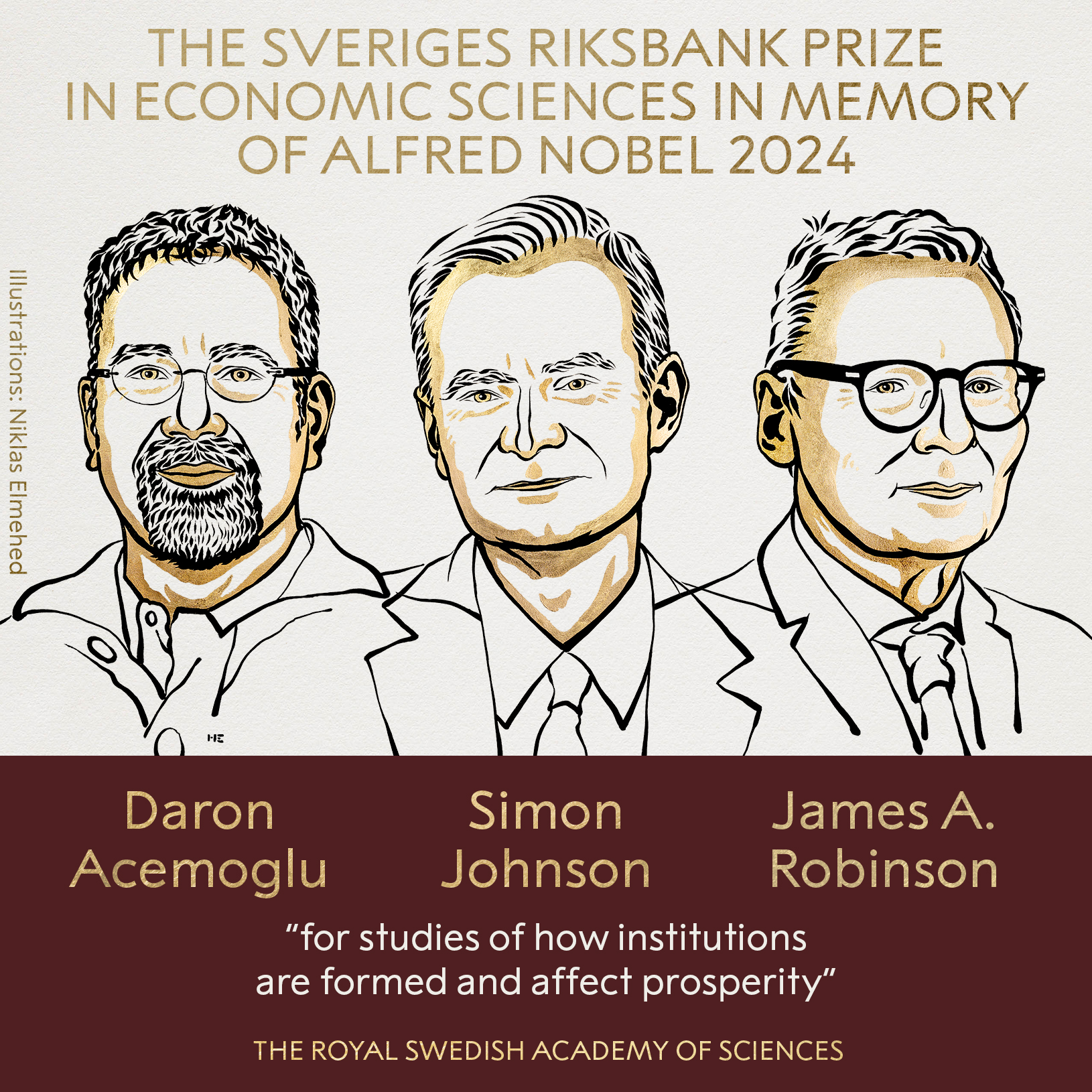The introduction of more inclusive institutions, less extraction and the rule of law would create long-term benefits. So why don’t the elite simply replace the existing economic system?
— The Nobel Prize (@NobelPrize) October 14, 2024
The laureates’ model for explaining the circumstances under which political institutions are… pic.twitter.com/oPCbMndkQM
A
A
Discover The Economic Secrets Revealed By The 2024 Nobel Laureates
Tue 15 Oct 2024 ▪
4
min read ▪ by
Getting informed
▪
Event
Summarize this article with:
The names of the 2024 Nobel Prize in Economics laureates are now known: Daron Acemoglu, Simon Johnson, and James A. Robinson. These economists have been awarded for their research on the causes of economic disparities between countries. Their work shows how institutions shape prosperity and influence global inequalities. By relying on empirical and theoretical analyses, they reveal the crucial impact of political and economic structures on development.

Economic institutions: pillar of prosperity
The 2024 Nobel Prize in Economics, which could have gone to this Bitcoin evangelist, highlights the research of Daron Acemoglu, Simon Johnson, and James A. Robinson on the importance of economic and political institutions. Their model explains how power struggles, popular mobilizations, and elite commitments shape the stability of a society.
The laureates demonstrate that countries with inclusive institutions that respect the rule of law prosper more than those where institutions exploit the population.
To support their conclusions, the economists studied real-life cases like the city of Nogales, divided between the United States and Mexico. North of the border, residents benefit from better economic opportunities and broader political rights, while in the south, conditions are tougher and development prospects are limited.
This comparison illustrates the fundamental role of institutions in wealth creation and reducing inequalities.
The keys to their model:
- Conflicts over resource allocation and power;
- Mobilization and pressure from the population on the elite;
- Commitment issues of elites facing necessary changes.
The importance of institutions is not limited to developing countries. The laureates show that even in the most advanced nations, institutional reforms can stimulate innovation and long-term progress.
Inequality: A global economic challenge
Economic inequalities represent one of the greatest challenges of our time. The work of the 2024 Nobel laureates offers a new perspective on the factors that exacerbate or mitigate them. By focusing on systems inherited from European colonizers, Acemoglu, Johnson, and Robinson highlight the links between the type of institutions in place and the level of prosperity of societies.

Authoritarian regimes, where institutions primarily serve the interests of an elite, struggle to create lasting benefits for the entire population. Inequalities persist, hindering innovation and economic development.
In contrast, societies that adopt inclusive institutions and encourage citizen participation manage to reduce income gaps. These institutions allow better redistribution of resources and facilitate necessary economic reforms.
The example of Claudia Goldin, Nobel laureate in 2023, also shows that gender inequalities in the labor market are directly influenced by institutional policies. Goldin’s work demonstrated the income disparities between men and women over the decades.
This year, the focus is on differences between nations, revealing the obstacles faced by populations in countries with failing institutions.
Although the hope of one day seeing the founder of Ethereum, Vitalik Buterin, win a Nobel Prize in Economics seems distant, the road remains open.
Maximize your Cointribune experience with our "Read to Earn" program! For every article you read, earn points and access exclusive rewards. Sign up now and start earning benefits.
A
A
La révolution blockchain et crypto est en marche ! Et le jour où les impacts se feront ressentir sur l’économie la plus vulnérable de ce Monde, contre toute espérance, je dirai que j’y étais pour quelque chose
DISCLAIMER
The views, thoughts, and opinions expressed in this article belong solely to the author, and should not be taken as investment advice. Do your own research before taking any investment decisions.